Many space operas depict an all-conquering humanity, dominating the local region or even the galaxy as a whole. Others feature humans vastly outmatched by galactic powers, a world for whom first contact was synonymous with being conquered. This doesn’t seem unreasonable: Terran technological civilization is young, while galactic cultures could have been around far longer. Just the fact that other civilizations can cross light-years suggests they have access to technology of which we can only dream.
There is a silver lining in this particular cloud. It is much easier to be a freedom fighter if there’s an empire from which to free oneself. The authors of these five Reagan-era works might agree.
Other Suns by Niall Shapero (1983)
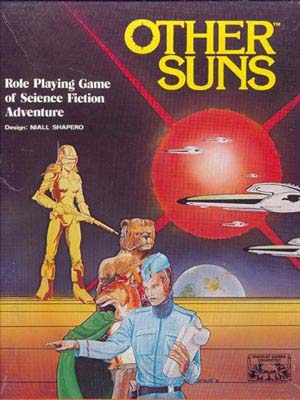
A tabletop roleplaying game.
Backstory: having survived nuclear war, unified under the Terran Empire, and developed faster-than-light drives, humanity was astonished to discover an ancient and highly advanced alien civilization spanning a third of the galaxy. The Terran Empire immediately set out to prove human supremacy by conquering the L’Doran Hegemony. Abject failure inspired the Terrans to try again.
By the era in which this vintage tabletop roleplaying game is set, galactic civilization has largely recovered from the failed barbarian invasion, radioactive Earth glows pleasantly, and members of the human diaspora live under governments dominated by species not inclined to set the galaxy aflame. The Hegemony isn’t a terrible place to live, but there’s nothing in the game forbidding humans from trying their hand at overthrowing it. Well, except for established law and the combined legal and military might of an ancient, galactic-scale government.
The real barrier to playing human freedom fighter/terrorist is that Other Suns offered a wide range of furry aliens one could play. Most seem more interesting than playing as humans.1
“Bloodchild” by Octavia E. Butler (1984)

Many cultures, encountering refugees, offer no comfort, only cold orders to move on. Encountering humans fleeing from other humans, the Tlic graciously provided the refugees with protection and new homes on a carefully monitored and sequestered Preserve. They even graced some humans with the opportunity to play an important role in Tlic society, as hosts for Tlic eggs.
Unlike most parasitoid aliens, the Tlic are not cruel or indifferent to host discomfort. They do their best to ensure the host’s health while making the entire process as pleasant as possible. This means very little to Gan, a young man not at all convinced he is willing to host alien young. Not that the Tlic really offer Gan a choice in the matter.
It’s kind of odd that alien and human biology are compatible enough for us to play aphid to their Aphidiinae wasp. Readers unfamiliar with Butler could do worse than to begin with this multi-award-winning novelette, which demonstrates nicely a circumstance frequently encountered in Butler stories: someone making the best deal possible while negotiating from a position of extreme disadvantage.
Starhammer by Christopher Rowley (1986)
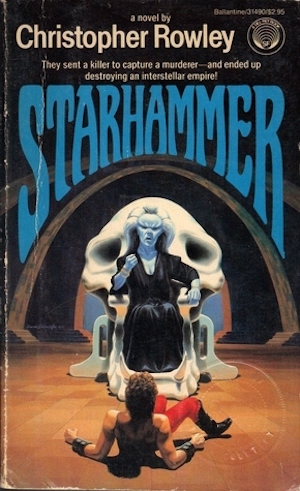
A thousand years after humans began venturing out in sublight starships, humans encountered the Laowon. The alien realm was vastly larger than human space, on top of which the Laowon possessed faster-than-light drives. Humanity was swiftly reduced to a subjugated species, exploited and abused according to Laowon whim.
Fifteen centuries later, there are still humans who dream of freedom. Hope appears in the form of the Starhammer, an ancient weapon whose name is not hyperbole. If an ambitious human can locate this relic of a long-vanished civilization, humanity might be liberated. Or perhaps, humanity will fall to a conqueror more terrible than the Laowon.
There’s always a catch to devices like the Starhammer, Foster’s The Tar-Aiym Krang, and Corey’s protomolecule; the catch is often (but not always) that Ultimate Weapons are designed to deal with Ultimate Enemies. Just because the civilization that built the Ultimate Weapon is long gone does not mean the Ultimate Enemy went away.
The Crown Jewels by Walter Jon Williams (1987)
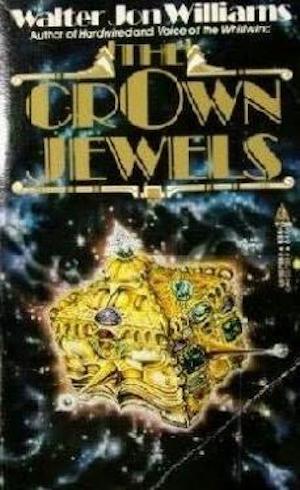
Khosali conquest of Earth took approximately as long as it would take to leisurely drink a cup of tea. Humans became just another subjugated race, its barbarous ways replaced by high culture, with suitably obsequious humans elevated to lesser nobility. The Khosali even appropriated certain colorful elements from Earth: Long live the cult of Elvis!
Khosali dynastic crisis allowed humans to establish their own government, one that followed the forms and customs of their former masters. Among said customs, the Allowed Burglar. Inspired by a kleptomaniac emperor, Allowed Burglars may purloin treasures…provided they do it with style. Allowed Burglar Drake Maijistral is capable and ambitious; also, as he discovers the hard way, unlucky enough to find that there are some treasures it’s best not to steal.
The Drake Maijistral books are, like the Anthony Villiers books to which they appear to be cousins, comedies. Alas, many SF readers are completely humorless (it is probably best not to mention a particularly humorless example by name) and the series did not prosper as much as it should have. Nevertheless, the Maijistral books are worth hunting down.2
The Empress of Earth by Melissa Scott (1987)
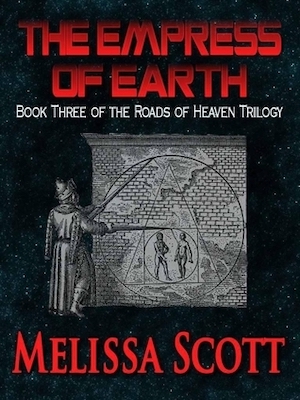
Star-pilot-turned-magus Silence Leigh elevated Adeban to Hegemon when she helped topple his predecessor. Adeban’s gratitude is matched only by his awareness that to publicly acknowledge his debt to a woman would be a fatal misstep in a society as relentlessly patriarchal as the Hegemony. Nevertheless, Adeban is a munificent if secretive patron, who sees in Silence and her husbands’ quest to reach long sequestered Earth a way to increase his son’s status.
Adeban’s son is left behind. Instead, the Hegemon’s daughter Aili stows away. The expedition succeeds in reaching Earth, only to discover that the political situation there is far more complex than they knew.3 Worst of all, while Silence and company may succeed in loosening the Rose World’s grasp on Earth, the cost may be replacing it with Hegemonic conquest.
***
Not every galactic power to set covetous eyes on Earth will be alien. In fact, the odds might favour human conquerors, being adapted as they are to terrestrial conditions.4 The great-great-grandkids of today’s stellar pioneers could be tomorrow’s invaders from the stars!
Of course, the theme of humans faced with unwillingly incorporation into galactic societies of varying degrees of unpleasantness is a very popular one. I could not begin to list them all and have not tried. Heinlein’s oeuvre alone includes a number of such narratives, but, as you know Bob, I won’t mention them here. If you feel I’ve overlooked noteworthy examples, feel free to mention them in comments, which are, as ever, below.
In the words of fanfiction author Musty181, four-time Hugo finalist, prolific book reviewer, and perennial Darwin Award nominee James Davis Nicoll “looks like a default mii with glasses.” His work has appeared in Interzone, Publishers Weekly and Romantic Times as well as on his own websites, James Nicoll Reviews (where he is assisted by editor Karen Lofstrom and web person Adrienne L. Travis) and the 2021 and 2022 Aurora Award finalist Young People Read Old SFF (where he is assisted by web person Adrienne L. Travis). His Patreon can be found here.
[1]“Other Suns” introduces the game’s combat system using a human character named Mikhail. The demonstration ends when he is arrested for demonstrating the combat system. Turns out that killing other characters is illegal. Bad news for would-be murderhoboes.
[2]Walter Jon Williams’ much later “Dread Empire’s Fall” reads almost as though the author set out to rewrite Drake Maijistral as a grim military SF epic. I can’t help but notice that his grim MilSF got more sequels than the SF caper original.
[3]Not that Silence and her husbands knew anything at all about Earth before traveling there.
[4]To be more precise: we humans are adapted to a tiny subset of terrestrial conditions. Your average human only prospers on a small percentage of the Earth’s land surface and does not do well when dropped into the sea or deposited anywhere near the Earth’s core.










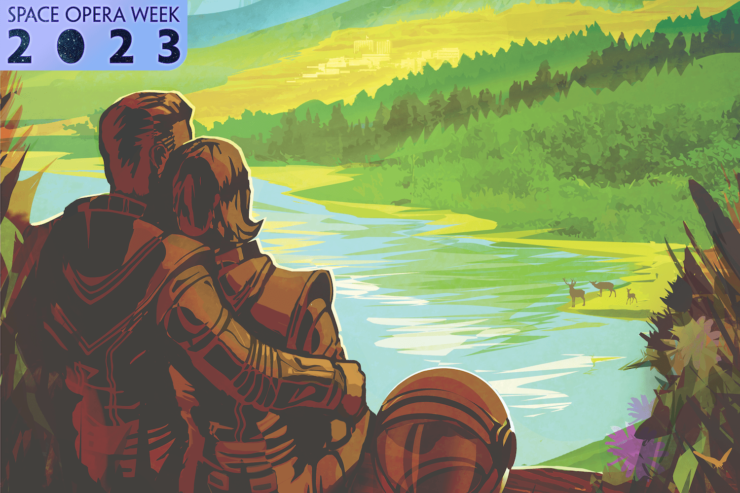
The Madness Season by C.S. Friedman – decades ago, Earth was conquered by an alien hive mind. Anyone who fights back or has high intelligence or creativity is either killed or taken away, never to be seen again, so the various subjugated people find interesting ways to resist their overlord(s). The main character often dips into trippy fever dreams and memory fugues, and is an entertainingly unreliable narrator. Also, there are not one but two types of vampires! In space!
Little Black Question: does Terra in Traveller count? It has a captive government in 1105, but a) only because tensions after the Solomani Rim War haven’t died down yet, b) it’s scheduled to return to home rule in a few years (still as part of the Third Imperium, but no right-minded sophont would object to that) and c) I’m not sure if Terra’s status was decided before or after 1 Jan 1980.
Invasion Earth came out in 1981, so given development times GDW must have been thinking about an Earth liberated from the cruel tyranny of local government by 1980, I think.
(for non-Traveller fans: Earth’s government pre-invasion, was, if I recall correct, a bunch of space Nazis so getting stomped by space feudalists was a step up)
Robert Silverberg’s short story The Pardoner’s Tale later incorporated into the novel The Alien Years. The occupying Entities do their things and mainly want people to do as they are told. Or else.
The Earth government in Brin’s UpLift end up functionally adopting some alien regulations, the aliens being judgmental, violent, and better armed. It’s unclear if this will be sufficient to keep the aliens from deciding to conquer Earth for its own good.
Gordon Dickson’s Way of the Pilgrim, a novel expanded from a short story, shows the power of myth making to encourage people to take up arms in a hopeless cause to free Earth from the alien invaders.
There was a book called The Way of the Pilgrim by Gordon Dickson, but I read it so long ago that I can’t remember much about it, other than the aliens were large and not evil or violent towards humanity, just…unrelentingly alien.
Under Alien Stars by Pamela Service was a rousing YA adventure where the alien overlord girl and the rebellious human boy find out there are worse aliens out there. Fonda Lee’s two YA novels, Exo and Cross Fire, also have humans under the thumb (equivalent) of aliens, and some humans benefiting from the arrangement.
Re: comment 3 – the pre-invasion government was space nazis according to the space feudalists. It’s pretty much always an open question how much of the fluff in Traveller is an accurate representation of reality and how much of it is what the Third Imperium tells itself about the galaxy.
6&7: One of you owes the other a Pepsi.
Before reading any of the other text, I looked at the illustration for Other Suns, trying to assess its 80s-ness. I thought, “that looks more like a game cover than a novel.” Nice trick, James.
Also: The great-great-grandkids of today’s stellar pioneers could be tomorrow’s invaders from the stars! A relatively recent work included that element, right? Multi-sided conflict, with an outside threat posed by a fleet of space-adapted human descendants? Terribly frustrating that I can’t recall the specific book or series.
@10. Hywel: Not especially recent, but that sounds like the three-way fight between the Hegemony of Man, the Ousters, and the TechnoCore in the Hyperion Cantos.
One important note about Bloodchild – Butler described it as a “pregnant man” story. Humans have to carry a living being, necessary for their hosts survival, in exchange for safety, protection, and being part of a “family”. The birthing process is hard and painful, and can be fatal, but medical technology makes it relatively safe, with adequate pain controls. Unless you don’t happen to be near the proper medical facility, or easy transportation to one, when the time comes, in which case you have a problem (the plot is essentially a back-seat-of-taxi parasite delivery). For the most part, being a host is a respected and welcome honor, and humans are happy to be part of the alien family, but there isn’t necessarily a right to choose.
The classic here is Clarke’s Childhood’s End (1953), which begins with a fleet of mile-wide flying saucers turning up and hovering there the way bricks don’t, soon followed by rule by the benevolent but never-seen overlords. 50+ years later they finally go public, and after the panic ends things settle down for a few decades leading up to the inevitable extinction event the Overlords have been grooming us for since their arrival.
Enormously influential – see e.g. V and Independence Day for less benevolent examples.
Ah, yes, the novel in which the great tragedy is that our alien overlords are sadly immune to being eaten by the giant space brain.
I would add the incredibly awesome “Footfall” by Larry Niven and Jerry Pournelle.
V may have gotten the mile-wide spaceship from Clarke, but the benevolent-aliens-that-eat-us was from Damon Knight’s 1950 “To Serve Man”, another alien overlord classic.
(we will not mention the whole “let’s steal oceans that we need to lift out of a 11.2 km/s gravity well”, instead of just grabbing one of the millions of giant ice-cubes floating in the outer orbits of the system.)
Conquest of Earth, by Manly Banister. copyrights 1955 by Ziff-Davis and 1957 by the author. The earliest ‘aliens stealing our water’ and ‘aliens killing us for our life-force’ that I’m aware of.
The other Tripods books by John Christopher would be a good example too.
James, you do say some things that make me laugh out loud. Is it possible you do not think these things you are saying are funny? Dry humour is still humour.
The Butler trilogy republished as Lilith’s Brood (first book: Dawn) also involves aliens controlling the mess we’ve made of Earth; they don’t make us bear their children, but they tend to gene-modify us in ways that they think will make us more useful — or at least less likely to make another mess. I get the impression Butler was on the side of the aliens, but I was particularly struck by their free use of something like GHB or Rohypnol; I’m allergic to assuming that any party is Right automatically, even if the author’s name isn’t Dickson.
Not written during Reagan era but the Vampire Earth series by E.E. Knight is another example.
The Tripods also just about squeaks in as a work of the 1980’s, as the prequel (When the Tripods Came) was released in 1988, and the TV series was earlier in the 80’s.
Stephen Baxter has us subjugated by several alien empires in succession. See Timelike Infinity for starters.
He really despises people!
The Miracleman comic series ended with some genetically altered superhuman (done with alien tech) and their alien allies replacing Earth’s national rule with an autocracy of the superhumans. The author considered that a good thing, since by the 80s, it was obvious that would be the only way to have the counterculture revolution he wanted. The token black character comparing humanity to children pretty much drove the author’s attitude home.
I vaguely remember a story (novella?) about a group of children with enhanced intelligence shot into space at relativistic speed where they develop almost mystical powers, get pissed-off, bombard the Earth with radiation (?) and eventually return. Any clue to help me figure out what I am referring to? Thanks.
@13 – That was my pick, too, but I believe the aliens guided us long before they “revealed themselves” to modern humans.
The reaction of humans when the aliens first showed themselves indicated that humanity had a “racial memory” of the overlords, and those memories were (mis)interpreted into such ideas as fallen angels.
I am surprised to be the first one quoting this. I am also apparently very, very old.
“One thing is for certain: there is no stopping them; the ants will soon be here. And I for one welcome our new insect overlords. I’d like to remind them that as a trusted TV personality, I can be helpful in rounding up others to toil in their underground sugar caves.” – Kent Brockman, “Deep Space Homer”, The Simpsons
The Gold at the Starbow’s End – Wikipedia
Apparently the radiation thing is in the novel-length extension. I’m not sure if I’ve read that one or not.
@27 That’s it. Thank you!
@15 Footfall is slightly off topic, in that the aliens fail. That’s a different sub-genre, attempted alien invasions, of which there are lots and lots and lots. It is also part of the very common and IMO lazy subgroup of that, where the aliens fail because aliens are just inferior to humans, so they may have a temporary technological advantage but in the end that isn’t enough of an edge compared to humans just being more awesome than they are. I don’t actually think it’s very good. Too much Pournelle, not enough Niven. I remember slogging through it and occasionally suddenly perking up and going “Oh, that’s gotta be a Niven bit!”–but not often enough.
Definitely the first one I thought of was David Brin’s Startide Rising et al. as mentioned by @5. Sure, internal Earth politics was not really hijacked, but humans had to get themselves a Patron alien race, and it was clear they were just lucky it was a race that didn’t feel like stomping on them; the core of the plot in “The Uplift War” revolves around the politics of Patronage and the possibility that they could end up with a more oppressive patron that makes things look much more like real conquest (and who might forcibly genetically engineer them to be more useful or something). So I’d say Earth has definitely been incorporated into an alien political system, somewhere on the lower-ish rungs (although not the bottom).
@25 That’s what a human character initially inferred. (And I’m guessing was Clarke’s intent when he wrote the initial story.) But later, Karellan reveals the truth:
“No one ever guessed, and you see now why we could never tell you. There was only one event that could have made such an impact upon humanity. And that event was not at the dawn of history, but at its very end. …When our ships entered your skies a century and a half ago, that was the first meeting of our two races, though of course we had studied you from a distance. And yet you feared and recognized us, as we knew that you would. … For that memory was not of the past, but of the future—of those closing years when your race knew that everything was finished. We did what we could, but it was not an easy end. And because we were there, we became identified with your race’s death. Yes, even while it was ten thousand years in the future! It was as if a distorted echo had reverberated round the closed circle of time, from the future to the past. Call it not a memory, but a premonition.”
@23 I’m never sure how much Moore buys into the utopia and how much he’s showing how the people taking over the world do. Some sympathetic human level characters have a different reaction: Liz leaves, Mike Moran’s mortal side takes himself out of the picture. And Moore handed the book over to Gaiman in, I think, full knowledge that the next phases would be about showing the cracks and dark side of things.
I’m sure that humbling and humiliating what he saw as political villains and oppressive systems involved some satisfaction. But given Moore’s use of ambiguity in other high-handed interventions like Watchmen, I’m not sure we were supposed to entirely cheer as the superman made by a Nazi cheerfully established himself as satrap for alien overlords and started dabbling in eugenics.
The Tripods trilogy, by John Christopher, was a favorite of mine growing up. Told from the viewpoint of a young boy who wins a competition to become a servant of the alien overlords. Images from the books still haunt my mind.
In White Queen, by Gwyneth Jones, the first of the Aleutian trilogy, vastly powerful aliens arrive. Did they invade and take over Earth, or are they just visiting and trying to help in their own way? The aliens are utterly bewildered and break into factions. Humans are equally confused and at cross-purposes. Jones excels at creating memorable, charismatic, sympathetic aliens who are utterly alien.
Puppies of Terra by Disch was *almost* in the 1980’s, coming out in 1978.
@27/@28: I read the magazine version, not the extension, back when I had time to read all the magazines (that had survived…); the shorter version may not have been explicit about the process but was clear that the astronauts had done something to ruin Earth from their considerable distance. And I would have sworn that the astronauts were adults rather than children in the magazine version, but it’s nowhere I can dig it up now.